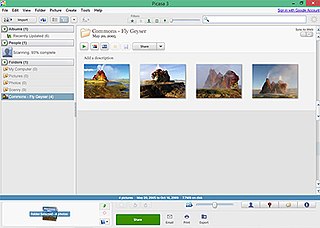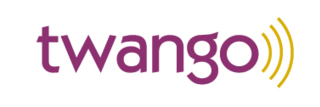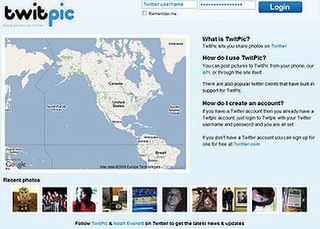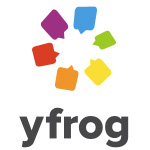
Picasa was a cross-platform image organizer and image viewer for organizing and editing digital photos, integrated with a now defunct photo-sharing website, originally created by a company named Lifescape in 2002. "Picasa" is a blend of the name of Spanish painter Pablo Picasso, the word casa and "pic" for pictures.

Flickr is an image hosting and video hosting service, as well as an online community, founded in Canada and headquartered in the United States. It was created by Ludicorp in 2004 and was previously a common way for amateur and professional photographers to host high-resolution photos. It has changed ownership several times and has been owned by SmugMug since April 20, 2018.
Fusker is a type of website or utility that extracts images in bulk from a website by systematically loading and downloading images following a pattern in the website's URL scheme. Fusking or fuskering is often used to extract private and nude photos without consent of the owner.

Image sharing, or photo sharing, is the publishing or transfer of digital photos online. Image sharing websites offer services such as uploading, hosting, managing and sharing of photos. This function is provided through both websites and applications that facilitate the upload and display of images. The term can also be loosely applied to the use of online photo galleries that are set up and managed by individual users, including photoblogs. Sharing means that other users can view but not necessarily download images, and users can select different copyright options for their images.
Photobucket is an image hosting and video hosting website, web services suite, and online community based in Denver, Colorado, United States. Photobucket once hosted more than 10 billion images from 100 million registered members. Links from personal Photobucket accounts were often used for avatars displayed on Internet forums, storage of videos, embedding on blogs, and distribution in social networks. Images hosted on Photobucket were frequently linked to online businesses, online auctions, and classified advertisement websites like eBay and Craigslist.
An image hosting service allows individuals to upload images to an Internet website. The image host will then store the image onto its server, and show the individual different types of code to allow others to view that image. Some examples are Flickr, Imgur, and Photobucket.
Yahoo! Photos was a photo sharing service launched on March 28, 2000 and owned by Yahoo!, designed specifically for Yahoo! users. Users created individual photo albums, categorized their photos and placed them in the corresponding albums. Users were also able to set access of their albums by publishing them for the viewing pleasure of everyone, disabling access, or marking them as private folders for their own viewing.

Bolt was a social networking and video website active from 1996 to 2007 before reopening in April 2008. It was shut down for a period of one year due to copyright violations leading to bankruptcy. It was acquired by new owners on January 4, 2008 and operated successfully for several months before announcing plans to go offline in October 2008.

ImageShack is a subscription-based image hosting website headquartered at Los Gatos, California.

Twango was an online media sharing site that supported multiple file types such as photos, video, audio, and documents. Founded in 2004 by Jim Laurel, Philip Carmichael, Randy Kerr, Serena Glover and Michael Laurel in Redmond, Washington, it provided users a means of repurposing their media, including sharing, editing, organizing and categorizing. In addition, Twango saved all the original media and its metadata. Non-members were free to browse the site, however only members could upload media to the site. Sign up for a basic account was free, and provided 250 megabytes of upload bandwidth a month.

Panoramio was a geo-located tagging, photo sharing mashup active between 2005 and 2016. Photos uploaded to the site were accessible as a layer in Google Earth and Google Maps. The site's goal was to allow Google Earth users to learn more about a given area by viewing the photos that other users had taken at that location. Panoramio was acquired by Google in 2007. In 2009 the website was among the 1000 most popular websites worldwide.
Fotki is a digital photo sharing, video sharing and media social network website and web service suite; it is one of the world's largest social networking sites. As an image hosting service, Fotki licenses photo-sharing software for global companies such as Telecom Italia, Alice.it, Sears, Mark Travel, Vegas.com, and Funjet.com, among others.

Wikimedia Commons, or simply Commons, is a wiki-based media repository of free-to-use images, sounds, videos and other media. It is a project of the Wikimedia Foundation.

Xtube was a Canadian pornographic video hosting service and social networking site based in Toronto, Ontario. It was established in 2006 and is notable for being the first adult community site to allow users to upload and share adult videos. Xtube was not a producer of pornography, instead it provided a platform for content uploaded by users. User-submitted content included pornographic videos, webcam models, pornographic photographs, and erotic literature, and incorporated social networking features.

TwitPic was a website and app that allowed users to post pictures to the Twitter microblogging service, which at the time of TwitPic's creation could not be posted to Twitter directly. TwitPic was often used by citizen journalists to upload and distribute pictures in near real-time as an event was taking place.

yfrog is a defunct image hosting service formerly run by ImageShack. It commenced operations in February 2009 and shut down in 2015. The service was designed primarily to allow users to share their photographs and videos as links on the Twitter microblogging platform.

The seizure of Megaupload, a popular filesharing website with 150 million registered users, occurred on January 19, 2012, following a US indictment accusing Megaupload of harbouring millions of copyrighted files. According to the indictment, Megaupload was costing copyright holders over $500 million in lost revenues.

Archive Team is a group dedicated to digital preservation and web archiving that was co-founded by Jason Scott in 2009.

Multiply was a social networking service with an emphasis on allowing users to share media – such as photos, videos and blog entries – with their "real-world" network. The website was launched in March 2004 and was privately held with backing by VantagePoint Venture Partners, Point Judith Capital, Transcosmos, and private investors. Multiply had over 11 million registered users. The company was headquartered in Boca Raton, Florida but moved to Jakarta, Indonesia early in 2012 and recently announced intentions to switch to e-commerce, dropping the social networking aspect entirely. Quantcast estimates Multiply had 2.47 million monthly U.S. unique visitors at their peak on July 30, 2012.















